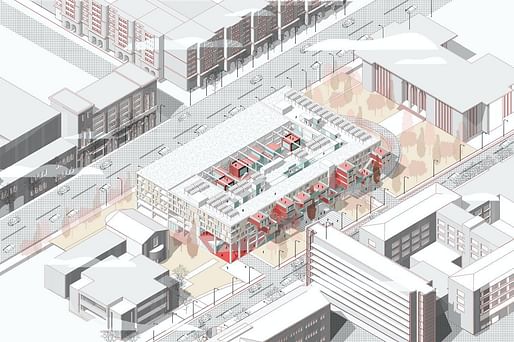

The National Council of Architectural Registration Boards (NCARB) has released a statement reaffirming its opposition to unpaid internships in architecture as well as offering advice for how firms and students can help combat the issue.
Under NCARB’s licensure rules, employers are required to compensate all students and licensure candidates for their work, regardless of duration or experience level. NCARB’s AXP Guidelines also state that “unpaid internships are not eligible to earn experience hours” with exceptions made for certain experiences garnered outside of architecture firms.
More broadly, the 1938 U.S. Fair Labor Standards Act demands that interns be paid at least the minimum wage, apart from a handful of exceptional circumstances including work shadowing, education, and an absence of financial benefit to the employer from the intern’s work.

“We believe that all emerging professionals should be paid for their work, and unpaid internships deepen existing barriers and inequities within the profession,” said NCARB in a statement. “Yet, a national non-profit reports that about 40% of all internships are unpaid, and an NCARB poll found that 32% of respondents were recently offered or saw a listing for an unpaid architecture internship.”
The national figure which NCARB refers to, carried out by the National Association of Colleges and Employers (NACE), also found that 81% of unpaid interns are women and that Black or African American students are more likely to experience unpaid internships.

To aid the effort of eliminating unpaid internships in architecture, NCARB is encouraging U.S. architects, licensure candidates, and students to take part in the organization’s Analysis of Practice survey, a study which will aid NCARB in shaping and amending licensing standards. Licensure candidates wishing to report violations of NCARB policies, such as unpaid internships, can also email whistleblower@ncarb.org or contact their architect licensing board.
“Architects have an ethical obligation to compensate licensure candidates for their work and provide meaningful internships that advance their skillset,” said NCARB President Alfred Vidaurri Jr. in a statement. “Over the course of my career, I’ve had the gratifying opportunity to guide several candidates through the licensure path—and I can’t imagine not paying them for their contributions.”
The discussion surrounding unpaid internships forms part of a broader discourse within architecture around labor practices. Earlier this year, we spoke to the UK’s Future Architects Front and the U.S.-based Architecture Lobby in a feature article on unpaid overtime in the profession. In addition, of the over 11,000 U.S.-based respondents to our ongoing Archinect Salary Poll, almost half (46.7%) have been subject to unpaid overtime, with only 20% receiving payment for overtime.
The statement by NCARB on unpaid internships also follows an analysis by the organization into how architectural education changed during 2020 in response to the COVID-19 pandemic and a joint NOMA/NCARB report exposing licensing exam disparities for people of color and older candidates.
17 Comments
unpaid internships equal negative experience.
Sad reality is that more and more companies are bidding on jobs with lower fees that have been mandated by the owners of the projects - i.e. the client. The days of bidding based on quality of work/presentation/value of the job are over. Clients are asking for timesheets for everything and basically reducing fees from a percentage base to an hourly charge. And some clients go even further by stating that the fee structure has a "cap" or an "upset limit" with no room to negotiate any changes, etc. to the work. Other than the handful of "starchitects" or "star engineers" out there, most small and medium sized firms are struggling to cover basic office expenses after wages because of the mess with fees - which, again, goes back to the client. A partner at one large architectural firm in Toronto told me that it takes up to 6 months of unpaid preparation work to go after a commission - and when there are several firms bidding the work, the chances are slim that they'll even get the work which means that it's 6 months of several designers and architects work wasted if they don't land the job. It's no wonder many engineering and architectural graduates are working in unpaid internships across North America and Europe because of the situation the firms find themselves in due to fees or lack thereof.
I seriously doubt that that is the case in Toronto and unpaid internships are not a thing in Canada. Yes, firms might burn cash reserves chasing a big project but that's not always the case. Smart offices make smart choices when they want to invest in a competition and many public RFPs have stipends for the offices on the short list.
Does NCARB have a position on rich kids opening up edgy little firms with their family money?
No shit NCARB, you just realized this 50 years too late
Didn't the AIA decree a long time ago that any project that used unpaid labor couldn't be entered for a design award? That's what apparently ended unpaid internships in my region.
SANAA is proof that neither the AIA or Pritzker give a damn about this.
But low-paid interneships that follow an expensive education that does not prepare people for actual work is OK.
Somebody mentioned 'gatekeepers' in another thread.
I think you're hitting on an issue, but I don't feel like you're hitting it with the right tool.
Architecture school costs too much.
When an internship is not an internship and someone is actually hired as a full time employee but paid like they are there for the summer.... that's a problem.
I'd say a lot of the stuff in-between the lines on those statements is up for debate.
My experience with drafters has really changed my own opinions about how well architecture school prepares people for the profession, and not in the direction that a lot of the naysayers might suggest.
I would love to see arch. schools do a better job of disclosing to students that their curriculum is leaving out big pieces of how architecture actually gets done in an office setting. Something needs to be done to soften the current disconnect that leaves recent grads shocked and dismayed by the nature of their initial entry-level architecture jobs.
school curriculums that have co-op / internship terms built in do an excellent job at exposing students to what skills are needed to transition to offices after graduating. those schools also tend to do things to prepare students skill-wise for the work terms.
imo, if the end goal of a student is to work in an architecture office...the best thing they can do education-wise is pick a school that offers co-op terms. it gives you an early peek into the profession, allowing them to see if this is really what they want to do. it also gives graduates a leg-up over students from other schools as they graduate with 6-18mo of experience (depending on the school) and references / connections with people in the industry.
What schools in the US are doing this? I am interested in reaching out to them when we have entry-level job openings.
pretty sure DAAP is still co-op.
I think the school in Cincinnati does too. I'm in Canada and the school's up here with work terms are Waterloo and
Dalhousie
NCARB talking a lot and doing nothing except sucking money out of the pockets of the profession they claim to protect as usual.
Let's not forget the wise words of the greatest designer of our times, Messr. Rashid, whose magnificent generosity has allowed so many young architects to learn invaluable lessons from his greatness - just by working for free.
Behold his genius: https://www.6sqft.com/karim-ra...
Block this user
Are you sure you want to block this user and hide all related comments throughout the site?
Archinect
This is your first comment on Archinect. Your comment will be visible once approved.